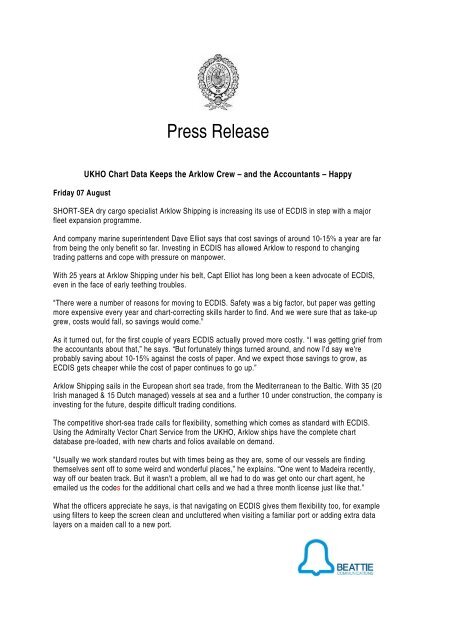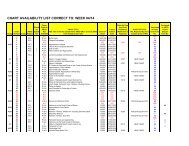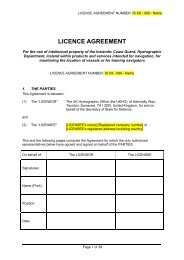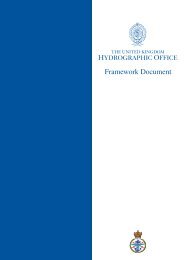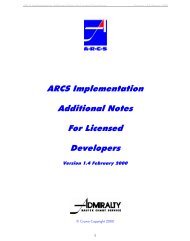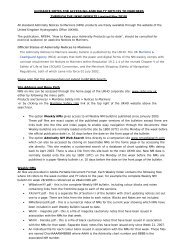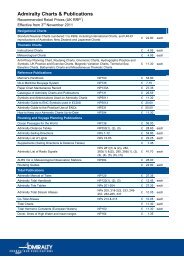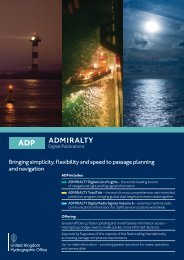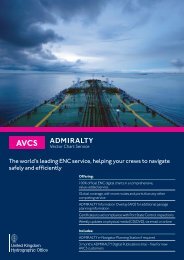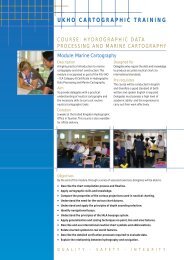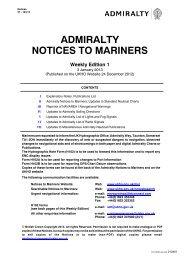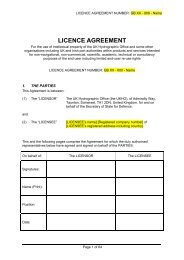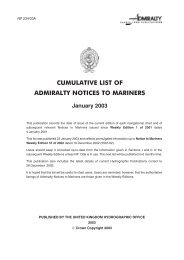UKHO Chart Data Keeps the Arklow Crew
UKHO Chart Data Keeps the Arklow Crew
UKHO Chart Data Keeps the Arklow Crew
Create successful ePaper yourself
Turn your PDF publications into a flip-book with our unique Google optimized e-Paper software.
Press Release<br />
Friday 07 August<br />
<strong>UKHO</strong> <strong>Chart</strong> <strong>Data</strong> <strong>Keeps</strong> <strong>the</strong> <strong>Arklow</strong> <strong>Crew</strong> – and <strong>the</strong> Accountants – Happy<br />
SHORT-SEA dry cargo specialist <strong>Arklow</strong> Shipping is increasing its use of ECDIS in step with a major<br />
fleet expansion programme.<br />
And company marine superintendent Dave Elliot says that cost savings of around 10-15% a year are far<br />
from being <strong>the</strong> only benefit so far. Investing in ECDIS has allowed <strong>Arklow</strong> to respond to changing<br />
trading patterns and cope with pressure on manpower.<br />
With 25 years at <strong>Arklow</strong> Shipping under his belt, Capt Elliot has long been a keen advocate of ECDIS,<br />
even in <strong>the</strong> face of early teething troubles.<br />
"There were a number of reasons for moving to ECDIS. Safety was a big factor, but paper was getting<br />
more expensive every year and chart-correcting skills harder to find. And we were sure that as take-up<br />
grew, costs would fall, so savings would come.”<br />
As it turned out, for <strong>the</strong> first couple of years ECDIS actually proved more costly. “I was getting grief from<br />
<strong>the</strong> accountants about that,” he says. “But fortunately things turned around, and now I'd say we're<br />
probably saving about 10-15% against <strong>the</strong> costs of paper. And we expect those savings to grow, as<br />
ECDIS gets cheaper while <strong>the</strong> cost of paper continues to go up.”<br />
<strong>Arklow</strong> Shipping sails in <strong>the</strong> European short sea trade, from <strong>the</strong> Mediterranean to <strong>the</strong> Baltic. With 35 (20<br />
Irish managed & 15 Dutch managed) vessels at sea and a fur<strong>the</strong>r 10 under construction, <strong>the</strong> company is<br />
investing for <strong>the</strong> future, despite difficult trading conditions.<br />
The competitive short-sea trade calls for flexibility, something which comes as standard with ECDIS.<br />
Using <strong>the</strong> Admiralty Vector <strong>Chart</strong> Service from <strong>the</strong> <strong>UKHO</strong>, <strong>Arklow</strong> ships have <strong>the</strong> complete chart<br />
database pre-loaded, with new charts and folios available on demand.<br />
"Usually we work standard routes but with times being as <strong>the</strong>y are, some of our vessels are finding<br />
<strong>the</strong>mselves sent off to some weird and wonderful places,” he explains. “One went to Madeira recently,<br />
way off our beaten track. But it wasn't a problem, all we had to do was get onto our chart agent, he<br />
emailed us <strong>the</strong> codes for <strong>the</strong> additional chart cells and we had a three month license just like that.”<br />
What <strong>the</strong> officers appreciate he says, is that navigating on ECDIS gives <strong>the</strong>m flexibility too, for example<br />
using filters to keep <strong>the</strong> screen clean and uncluttered when visiting a familiar port or adding extra data<br />
layers on a maiden call to a new port.
Filtering has o<strong>the</strong>r benefits too, such as <strong>the</strong> ability to set <strong>the</strong> ECDIS to display only <strong>the</strong> draught relevant<br />
to <strong>the</strong> ship. “Officers of <strong>the</strong> watch and masters will have <strong>the</strong>ir own preferences for what information <strong>the</strong>y<br />
like to have in front of <strong>the</strong>m and <strong>the</strong> system makes it easy to set it up <strong>the</strong> way you like it, without<br />
interfering with <strong>the</strong> safety parameters of ECDIS ” he adds.<br />
This has paid huge dividends as ECDIS was deployed across <strong>the</strong> fleet and Capt Elliot says <strong>the</strong> greatest<br />
surprise has been <strong>the</strong> attitude of <strong>the</strong> senior crew. "We feared <strong>the</strong> young lads would approach ECDIS<br />
like ano<strong>the</strong>r video game, and older mates and master who viewed <strong>the</strong> introduction of metric charts as<br />
<strong>the</strong> Devils work would be dragged kicking and screaming in front of an ECDIS screen"<br />
But if <strong>the</strong> company had anticipated resistance elsewhere, <strong>the</strong>n “mates in <strong>the</strong>ir 50s, masters of 65 and<br />
up” have been among <strong>the</strong> system’s biggest fans. All <strong>Arklow</strong> vessels still carry about 20 paper charts –<br />
enough to ensure safe passage to an anchorage whatever happens but Capt Elliot says; "They tell me<br />
<strong>the</strong> paper never comes out <strong>the</strong>se days. They love it!"<br />
That willingness to work with change is crucial because of <strong>the</strong> squeeze on resources onboard ship and<br />
<strong>the</strong> need for new skills that emerge to complement <strong>the</strong> technology. Capt Elliot says <strong>Arklow</strong> had for some<br />
years noted <strong>the</strong> increasing scarcity of chart-correcting skills.<br />
“It's <strong>the</strong> kind of thing you used to pick up on-board, just by watching and learning when things were<br />
quiet. But now, with reduced manning levels and fast turnarounds, you just don't get those quiet times<br />
any more. Obviously all those problems go away with ECDIS – you just stick in <strong>the</strong> CD and that's it –<br />
you're done.”<br />
<strong>Arklow</strong> took its first steps in electronic navigation 14 years ago, using raster charts on its newbuilding<br />
<strong>Arklow</strong> Castle and today has a type-approved dual-ECDIS and official Electronic Navigation <strong>Chart</strong>s from<br />
<strong>the</strong> <strong>UKHO</strong>.<br />
The company considered alternatives for its ENC data - "We're a business after all and we have to keep<br />
<strong>the</strong> accountants happy!" – but in <strong>the</strong> end followed <strong>the</strong> advice of long-time supplier Todd <strong>Chart</strong> Agency in<br />
Bangor, County Down to select AVCS.<br />
<strong>Arklow</strong> now has Sperry Naviecdis running on most of its fleet, with SAM equipment going into <strong>the</strong> new<br />
ships being built in Korea, something Captain Elliot views as <strong>the</strong> next stage in <strong>the</strong> learning process. "We<br />
probably would have preferred to keep one system throughout but we don't have any major issue with it.<br />
There are benefits too – we'll be comparing <strong>the</strong> two systems as we go, learning more about strengths<br />
and weaknesses."<br />
Ends<br />
Notes to Editors<br />
1. <strong>UKHO</strong>, which is part of <strong>the</strong> Ministry of Defence, has been charting <strong>the</strong> world’s oceans for more<br />
than 200 years with <strong>the</strong> primary aim of providing navigational services for <strong>the</strong> Royal Navy and<br />
merchant mariners to save and protect lives at sea. In addition it also serves <strong>the</strong> small craft and<br />
leisure mariners and provides a range of consultancy services.<br />
2. <strong>UKHO</strong> produces a worldwide series of some 3,300 paper nautical charts and 160 publications<br />
under <strong>the</strong> Admiralty brand and has a growing portfolio of Electronic Navigational <strong>Chart</strong>s<br />
(ENCs). These charts are sold globally and used by nearly 70 per cent of international shipping.<br />
3. <strong>UKHO</strong> is a Trading Fund which means it is a government agency owned by <strong>the</strong> MoD with <strong>the</strong><br />
freedom to trade commercially to generate revenue and cover running costs.
4. <strong>UKHO</strong> also plays a central role, in support of <strong>the</strong> Maritime and Coastguard Agency, in<br />
discharging <strong>the</strong> navigation element of <strong>the</strong> UK’s Safety of Life at Sea Treaty obligations for<br />
waters of UK national responsibility.<br />
5. AVCS brings toge<strong>the</strong>r Electronic Navigational <strong>Chart</strong>s (ENCs) from national hydrographic offices<br />
around <strong>the</strong> world and new ENC coverage produced by <strong>UKHO</strong> in co-operation with Foreign<br />
Governments to provide comprehensive, official, worldwide coverage.<br />
www.ukho.gov.uk<br />
Issued by Beattie Communications (www.beattiegroup.com) on behalf of <strong>UKHO</strong><br />
For fur<strong>the</strong>r information please contact:<br />
Neil McDonald 01698 787855 / 07725 466737<br />
neil.mcdonald@beattiegroup.com<br />
Kimberley Hamilton 01698 78 78 58/ 07525 855 422<br />
kimberley.hamilton@beattiegroup.com


